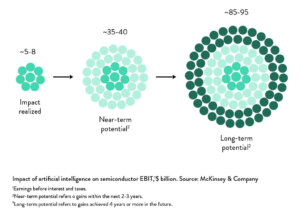When it comes to artificial intelligence (AI), the semiconductor industry sits in a unique position as both creator and user of AI technology. The advanced computer chips that semiconductor manufacturers design and fabricate are what make AI possible. The chip industry then benefits from using those AI chips and software to optimize its semiconductor manufacturing processes. In that way, AI can facilitate incredible breakthroughs across the entire semiconductor manufacturing value chain.
Right now, the chip and AI industries are at an inflection point. The same conventional chips that have been used in PCs and servers have gotten us this far. To get to the next level in AI will take leading-edge chip and packaging solutions. When these new integrated systems reach the market, everything will be set in motion for AI to truly reach its fullest potential.
Multiple Microprocessor Chips Are Driving Next-Gen AI
Although we’ve reached the point where standard ICs have laid the foundation for advanced AI, they struggle to keep up with the computing functions that are needed with the large amounts of data input and the algorithms that are used for today’s AI applications. Because of this, AI chip design is evolving to feature multiple microprocessors and accelerators that perform the different functions needed for the AI applications.
AI Enables More Efficient Fabs
Fortunately, capital investment in advanced nodes to boost AI chip technology is increasing faster than ever. For context, McKinsey highlights how AI and machine learning (ML) are responsible for $5 billion to $8 billion in annual earnings for semiconductor companies. While this is notable, the article continues to explain how that’s just 10% of the value that AI and ML can bring to the industry.
In the next four-plus years, that figure is expected to rise to $85 billion to $95 billion annually, or 20% of the industry’s revenue, as illustrated in Figure 1. With faster and smarter chips just inches from our doorstep, companies that have the capital to race ahead to the most advanced nodes will gain a significant competitive advantage in the upcoming years.

Figure 1: Artificial intelligence could generate $85 billion to $95 billion for semiconductor companies over the long term. (Source: McKinsey & Company)
As AI chips become increasingly powerful, fabs will also evolve from standard automation in favor of full-factory intelligence. Although that won’t happen overnight, some companies are beginning to make this future a practical reality. At Kiterocket, we’re excited to work closely with these types of companies to help them spread the word about the power of AI.
For example, we helped launch Lynceus, a start-up company that is using AI and ML to transform process control through predictive modeling. The company’s AI platform can integrate into any semiconductor manufacturing environment to analyze existing data at each process step. From there, the data helps illuminate the potential impact of each tool on manufacturing performance, the stability of each system, and the feasibility of scaling. When it comes to the future of AI, Lynceus demonstrates how generating actionable data will be crucial for producing next-gen AI chips.
In the meantime, AI is already being used within fabs to boost AI chip yield, increase throughput, and more. Just like Lynceus is collecting critical tool data, there are several ways AI is helping fabs operate most efficiently to create the next generation of chips. In addition to virtual metrology, other uses for AI include reducing R&D costs, optimizing chip design, and improving visual wafer inspection – all with the end goal of informing automatic decision-making.
As we move toward this goal of real-time, automatic decision-making, we’ll also notice an increase in visibility across the entire chip manufacturing process. Because data silos currently challenge the manufacturing environment, AI will help bridge the gap between operations, supply chains, enterprise resource planning, and all other sectors responsible for creating and distributing chips.
If you’re a semiconductor brand that’s pushing the boundaries of AI during this transformational time in industry history, Kiterocket wants to work with you to elevate your PR and communications strategy to new heights. With more than 15 years of targeted experience in the semiconductor industry, we have the subject-matter expertise and technical background to advance your cutting-edge brand that’s advancing the world. To discover your company’s full communications potential, contact us today.


